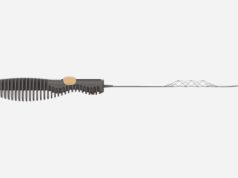 Rapid Medical has announced new data demonstrating “excellent” first-pass treatment success using the Tigertriever device in complex ischaemic stroke patients with underlying intracranial atherosclerotic disease (ICAD). The complication rates were also negligible, as reported at the ongoing Society of Vascular and Interventional Neurology (SVIN) annual meeting (16–18 November 2023, Miami, USA).
Rapid Medical has announced new data demonstrating “excellent” first-pass treatment success using the Tigertriever device in complex ischaemic stroke patients with underlying intracranial atherosclerotic disease (ICAD). The complication rates were also negligible, as reported at the ongoing Society of Vascular and Interventional Neurology (SVIN) annual meeting (16–18 November 2023, Miami, USA).
“Patients with ICAD experiencing a stroke are very challenging to treat and often need rescue therapy, such as stenting,” stated Edgar Samaniego (University of Iowa, Iowa City, USA), lead author of this research, which has since been published in the Journal of NeuroInterventional Surgery. “We achieved very high treatment success and lasting results with Tigertriever alone that we have not seen with other devices. We attribute this to Tigertriever’s unique ability to open and dilate these blocked vessels—a new term we call ‘stentplasty’.”
This subanalysis of the prospective TIGER trial showed that 78% of ICAD patients achieved successful reperfusion without further intervention, and 47% achieved recanalisation on the first procedural pass, Rapid claims in a press release. These results are “significantly better” than studies utilising other devices in this unique patient population, the company also says, adding that Tigertriever in ICAD rivals results only thought possible in non-ICAD patients.
Another benefit of the high first-pass success rates was “very fast” procedure times; a median groin-to-revascularisation time of 22 minutes is “the fastest reported in any prospective, randomised trial”, according to Rapid. Some 50% of these patients also had a good clinical outcome defined as a modified Rankin scale (mRS) score of 0–2 at 90 days.
Rapid further claims that, unlike conventional stent retrievers, the Tigertriever device offers the “distinctive capability” to control radial expansion after it is positioned in a brain artery, providing exclusive advantages for ICAD patients. In addition to successful reperfusion in the present subanalysis, Tigertriever significantly dilated the artery such that no patient required permanent stenting.
Patients included in the study did not suffer symptomatic intracranial haemorrhage (sICH), vessel dissection, or embolic complications—which are typically more frequent in these ICAD patients. Rapid attributes these successes to the fact the device can be contracted to minimise disruption to the plaque and arteries during removal.
“Physicians now have a better and faster treatment option for patients with severely narrowed, stenotic arteries,” said Samaniego. “Tigertriever provides a higher rate of successful reperfusion, reduced complications, and a needed angioplasty-like effect compared with historical studies that utilised other mechanical thrombectomy devices.”









